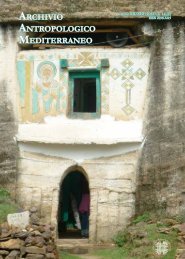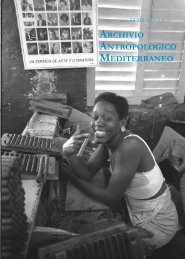“Arabi della panna”. Dominio e dissenso tra i - Archivio ...
“Arabi della panna”. Dominio e dissenso tra i - Archivio ...
“Arabi della panna”. Dominio e dissenso tra i - Archivio ...
Create successful ePaper yourself
Turn your PDF publications into a flip-book with our unique Google optimized e-Paper software.
<strong>Archivio</strong> Antropologico MediterrAneo on line, anno XII/XIII (2012), n. 14 (1)<br />
ries, determines the conditions of access to specific rights,<br />
shapes bodily practices and as a field where new senses of<br />
belonging and (bio)sociality can arise. A field where the<br />
associations of sick people can experience new subjectivities<br />
and new practices of citizenship education.<br />
Keywords: Ethiopia; AIDS; Associations; Citizenship;<br />
medical system<br />
alessia villanucci<br />
Dipartimento di Scienze cognitive e <strong>della</strong> formazione<br />
Università degli Studi di Messina<br />
alessia.villanucci@gmail.com<br />
Una “medicina <strong>tra</strong>dizionale moderna” <strong>tra</strong> istituzioni politiche<br />
e associazioni di guaritori in Tigray (Etiopia)<br />
Contestualmente alla decen<strong>tra</strong>lizzazione del sistema sanitario<br />
e all’apertura al libero mercato in<strong>tra</strong>prese dal governo<br />
federale etiope, si assiste, da parte delle istituzioni,<br />
ad un rinnovato interesse nei confronti delle risorse terapeutiche<br />
<strong>tra</strong>dizionali.<br />
Dai risultati di una ricerca etnografica compiuta nella<br />
città di Mekelle, capitale dello Stato del Tigray, è emerso<br />
come intorno alla prospettiva <strong>della</strong> professionalizzazione<br />
dei guaritori convergano e si scontrino interessi molteplici<br />
e spesso divergenti, su scala locale, nazionale e<br />
<strong>tra</strong>nsnazionale. In tale contesto, è la categoria stessa di<br />
“medicina <strong>tra</strong>dizionale” a essere costantemente ridefinita<br />
e manipolata a seconda degli scopi perseguiti dai<br />
differenti attori in gioco.<br />
At<strong>tra</strong>verso l’analisi delle s<strong>tra</strong>tegie di legittimazione<br />
messe in atto dai guaritori <strong>tra</strong>dizionali (e dalle loro associazioni)<br />
e l’esposizione di casi etnografici specifici, si<br />
mostrerà come la dicotomia <strong>tra</strong>dizione-modernità risulti<br />
euristicamente inefficace nell’analizzare le dinamiche in<br />
atto in un contesto caratterizzato dalla coesistenza concorrenziale<br />
di una pluralità di risorse terapeutiche.<br />
Parole chiave: Etiopia; Sistema medico plurale; Medicina<br />
<strong>tra</strong>dizionale; Professionalizzazione; S<strong>tra</strong>tegie di legittimazione<br />
A “<strong>tra</strong>ditional modern medicine” among political institutions<br />
and healers associations in Tigray (Ethiopia)<br />
Together with the decen<strong>tra</strong>lization of the health system<br />
and the market liberalization started by the Ethiopian federal<br />
government, we have seen the institutions’ renewed<br />
interest toward <strong>tra</strong>ditional therapeutic resources.<br />
The results of an ethnographic research carried out in Mekelle,<br />
the capital city of Tigray Regional State, have shown<br />
how multiple and often differing interests – at local, national<br />
and <strong>tra</strong>nsnational level - converge and clash around<br />
116<br />
the prospect of the professionalization of <strong>tra</strong>ditional healers.<br />
In such a context, the category of “<strong>tra</strong>ditional medicine”<br />
is continuously redefined and handled in relation to<br />
the aims pursued by the different actors at stake.<br />
Through the analysis of the s<strong>tra</strong>tegies of legitimization<br />
enacted by the <strong>tra</strong>ditional healers (and their associations)<br />
and by showing particular ethnographic cases, the paper<br />
will show how the <strong>tra</strong>dition-modernity dichotomy is heuristically<br />
ineffective in order to analyze the dynamics that<br />
shape a context characterized by the coexistence and competition<br />
of a plurality of therapeutic resources.<br />
Keywords: Ethiopia; Plural medical system; Traditional<br />
medicine; Professionalization; S<strong>tra</strong>tegies of legitimization<br />
Francesca Meloni<br />
McGill, Social and Transcultural Psychiatry<br />
francesca.meloni@mail.mcgill.ca<br />
“Il mio futuro è scaduto”: Politiche e prassi di emergenza<br />
nelle vicende dei rifugiati in Italia<br />
Nel contesto italiano ed europeo di politiche basate<br />
sull’emergenza, molti rifugiati, soprattutto nei centri urbani,<br />
vivono in condizioni di emarginazione sociale. Nel<br />
2007, a Torino, queste situazioni sono state rese visibili<br />
at<strong>tra</strong>verso l’occupazione di un edificio, da parte di alcuni<br />
centri sociali e di rifugiati senza dimora. Basandosi su<br />
un’indagine etnografica svolta dal 2007 al 2009, questo<br />
articolo vuole indagare le prassi di diversi attori sociali<br />
– istituzioni, terzo settore, rifugiati – coinvolti nelle vicende,<br />
analizzando la complessità delle loro voci, motivazioni,<br />
s<strong>tra</strong>tegie e relazioni. In particolar modo, l’articolo<br />
intende esaminare come i soggetti diventino “attori<br />
dell’emergenza”, relazionandosi a un contesto legislativo<br />
e sociale che dimentica e rimuove le alterità.<br />
Parole chiave: Rifugiati; Politiche; Italia; Emergenza;<br />
Occupazione<br />
“My future is expired”: Emergency refugees policies and<br />
practices in Italy<br />
Within European and Italian policies based on emergency,<br />
many refugees in Italy, especially in urban contexts, do not<br />
find housing and live in situations of social exclusion. In<br />
2007, in Torino, these emergency situations were made<br />
visible through the squatting of a building, led by refugees<br />
and squat centers. This article focuses on the practices<br />
of few subjects – institution, ngos, refugees – involved in<br />
these emergency situations, analyzing the complexity of<br />
their voices, stakes, s<strong>tra</strong>tegies and relations. The article<br />
particularly examines how these subjects become “actors<br />
of emergency”, within a social context which forgets and






